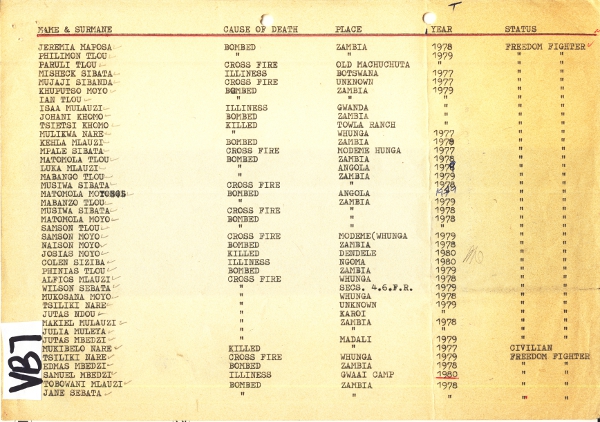The liberation movements that led the armed struggle for Zimbabwean independence evolved from trade union and nationalist organisations which, in turn, developed into mass protest in the 1950s. As the people's movement grew stronger at the end of the decade, the settler politics moved ever further to the right, restricting the possibility of a negotiated road to majority rule and then independence.
The Southern Rhodesian African National Congress was banned in 1959 by the government of Edgar Whitehead, its successor, the National Democratic Party, met the same fate in December 1961 after it rejected constitutional proposals which had been accepted by the white electorate, proposals that would have paved the way for independence in Rhodesia without the achievement of majority rule, thus leaving power in the hands of the white settlers.
The successor to the NDP was the Zimbabwean African People's Union (ZAPU), formed at a time when peaceful paths to independence under a black government were closing, and nationalist supporters, especially in the Youth Wing, were becoming increasingly militant, demanding they be provided with weapons to seize power themselves. By the time ZAPU was banned in September 1962, plans were already being made for the acquisition of thos e weapons, and the first cadres were undertaking sabotage. Soon after the banning, the party leadership took two important decisions: they would not form another legal party and they would begin to prepare for a war of liberation. Seventeen years later, independence was won and an African government took power.
In 1962, ZAPU established its offices in Luzaka, Zambia, a country already moving towards independence with majority rule. The party began to build an army to conduct guerrilla war. It recruited and trained many thousands of young people to fight for liberati on. It also received tens of thousands of refugees towards the end of the war in the late 1970s, and was responsible for accommodating them and educating those who were too young to fight.
The record of that long struggle survives in many quarters - of ficial documents, news reports, academic articles and books, photographs, and most importantly in the memories and private papers of the participants who are still alive more than 30 years later. However, the Zimbabwean government has, since 1980, been dominated by ZANU, a political party formed as a break-away from ZAPU in 1963. Within this context, the story of ZAPU's role in the liberation struggle has been eclipsed, deliberately underestimated by official Zimbabwean sources, and largely not understood by many sympathisers.




